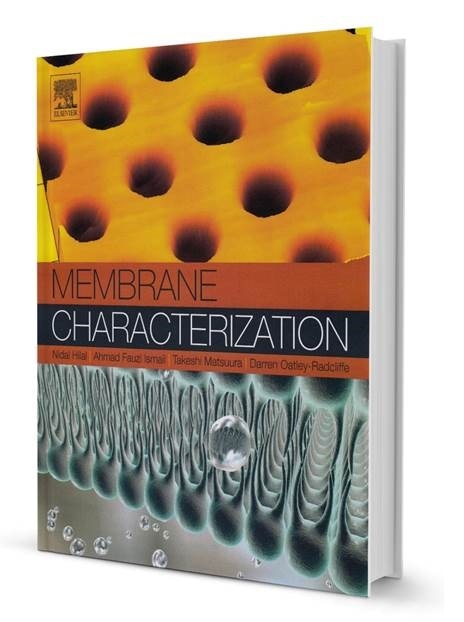In a newly published and ground-breaking text, senior academics from Swansea University have concluded that membrane characterisation is essential for the continued growth in the industrial application of membranes.
Today there are key industrial membrane applications such as desalination, commodity chemical processing and waste water treatment, however, membranes are also being fabricated for use in fuel cells, pharmaceutical production and emerging medical technologies such as tissue engineering.
Professor Nidal Hilal (Chair in Water Process Engineering, Director of Centre for Water Advanced Technologies and Environmental Research, CWATER, and Editor-in-Chief of the International journal Desalination) and Dr Darren Oatley-Radcliffe (Associate Professor in Chemical Engineering) both from the College of Engineering, Swansea University are the co-authors of the recently published handbook titled ‘Membrane Characterization’

The handbook is an extremely important resource for professionals in the fields of analytical science, materials engineering, and environmental chemistry, as well as both chemical and environmental engineering.
The handbook addresses membrane characterisation and comprehensively reviews and assesses the methodologies and techniques available for inorganic, polymeric and composite membranes. A vast array of commercially available and advanced laboratory techniques are discussed, explained and put into factual context through diagrams, descriptions and worked examples that illustrate and inform the reader.
The authors remarks assume significance following an industry study that reports global demand for membranes is projected to increase by a healthy 9.5% annually to US$32.14 billion by 2020, where ceramic membranes are expected to enjoy the highest growth rate of 11.96% owing to their superior performance and durability and nanofiltration technology is projected to have the highest growth at 12.55%.
Other key areas of future growth are expected to come from the food processing, pharmaceutical and medical sectors and the fastest growth area is expected to come from industrial gas processing. Thus, membranes have a healthy outlook and the key to a successful membrane processes is highly effective characterisation.
The Freedonia Group is a leading international business research company that publishes more than 100 industry research studies annually. It predicts that rising environmental standards and regulations in many parts of the world, and high population growth, particularly in water-stressed areas, will further drive investment in membrane-based water and wastewater systems.
Oil-rich nations are increasingly shifting to more efficient membrane desalination systems (reverse osmosis) and the Middle East and North Africa will account for about two-thirds of global demand for desalination products and services, the study adds and points out that Saudi Arabia, Qatar, UAE and Kuwait are the largest desalination markets in the Middle East.
The handbook by Professor Hilal and Dr Oatley-Radcliffe presents a comprehensive review of the current best practice for membrane characterisation. The book is subdivided into sections related to spectroscopic methods, microscopy, physical and chemical techniques, mechanical properties, mass transport, modelling and feed material characterisation.
The focus is on demonstration of these important techniques through theoretical descriptions, diagrams, real images, and typical expected outputs; all of which are illustrated with real data and worked examples. Successful characterisation is key for the development of new industrial applications and the optimisation of existing processes. According to them, membrane processes have many more applications apart from desalination.
Professor Hilal said: “In addition to their use in water treatment and desalination, membrane processes are used in pharmaceutical industries to separate valuable medical products including solids such as powders in the size range between one nanometre and 10 microns.”
Dr Oatley-Radcliffe added:
The importance and versatility of membrane systems is highlighted in a range of industries such as water treatment and desalination, however, there is great potential in the emerging separation areas of fuel cells, pharmaceutical production, medical technologies, biorefining and fuel production.”
The book presents a state-of-the-art in membrane characterisation of functional properties such as pore size and distribution, surface topography, morphology and roughness, chemical composition, surface charge, hydrophobicity and hydrophilicity, transport mechanisms on materials in both the gas and liquid phase, mass transport phenomena and fouling behaviour.
In addition, the book also offers a complete section on the mechanical properties of membranes and modules, such as tensile strength, bursting pressure, bending moments, mechanical degradation and stress-state analysis. This is a first of its kind text and these characterisation techniques are often neglected by manufacturers and operators alike to the detriment of the subsequent process.
Professor Hilal concluded: “Membrane characterisation techniques will have significant impact on industry as they will lead to an optimized membrane processes that offers higher product quality and an increased product range at significantly reduced cost. More specifically, process engineering including the water/wastewater treatment and desalination industries will benefit from operating with increased fouling-resistant membranes as this will reduce operational fouling problems and therefore reduce cost.”